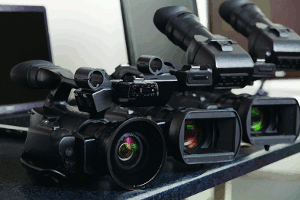Class Act: It’s Not About the Equipment
One of the most common questions I hear from educators looking to start producing video is one that I suspect a lot of readers have heard: "What camera should I buy?" On the surface, it's quite an innocuous query, seemingly simple to answer. Yet, bundled up in there is a very common and pernicious assumption, that the key to good video is all about the equipment you use.
Equipment matters, of course. I'm a gear geek at heart, happy to spend hours reading about the newest cameras, carefully considering the minutest detail of their features and supposed superiority over competing products. When I was shooting every day in standard definition, my heart was filled with lust upon the arrival of the first HD cameras. When I was able to make the HD leap, the additional resolution and latitude gave me some more flexibility in shooting and postproduction. Several productions truly benefitted from the sharper image. But I know I didn't suddenly start producing better videos.
Even once I had become comfortable shooting in HD, I still didn't retire my old reliable DV cameras. That's because not every project is screaming to be shot in HD, nor is it economical to also have to deal with the additional data, processing power, and rendering time HD requires. Sometimes reliable and quick SD is the better choice.
Which brings me back to that pernicious question: "What camera should I buy?" The answer is always, "It depends." Just to start, it depends on what kind of video you're trying to shoot, whether or not you have any production experience, and what other kind of equipment you plan to buy. Too often, I find that administrators and department heads are all too willing to allocate thousands of dollars to make sure to get a "good camera" without considering any of these other issues. Requests to divide the budget to include essential gear such as microphones, tripods, and lights are sometimes met with resistance, fuelled by worries that their purchase will put the best camera out of reach.
When talking to a group just starting to get into video, I often make two suggestions that don't directly answer the question. After asking what the first project is, sometimes I'll suggest not buying any equipment at all. Instead, I'll recommend hiring an experienced videographer who owns his or her own gear and ask if he or she will be willing to let them observe his or her at work and ask questions. Not every videographer has the patience for doing this, but if he or she builds it into the budget, it even can be a little fun and enlightening for everyone involved.
If there is no immediate project at hand-and if the group would like to start recording lectures-then I'll suggest that part of the equipment budget should first be spent on some training for the folks expected to do the production. Introductory, hands-on courses available from a variety of providers. There are also books, DVDs, and online courses that do a good job of demonstrating the fundamentals. Most of these cost significantly less than a camera and make for a more valuable long-term investment.
But what about the camera? After the training, a decent camera might still be in the budget, and the freshly trained videographer will be
in a much better position to evaluate what model best suits his or her needs, and whether it makes sense to buy or rent.
Once production ramps up, it makes sense to have a cupboard full of equipment. However, without some training, practice, expertise, and purpose, that gear will easily become like dusty exercise equipment stowed away in the basement-a painful reminder of great plans undermined by inadequate preparation and execution.